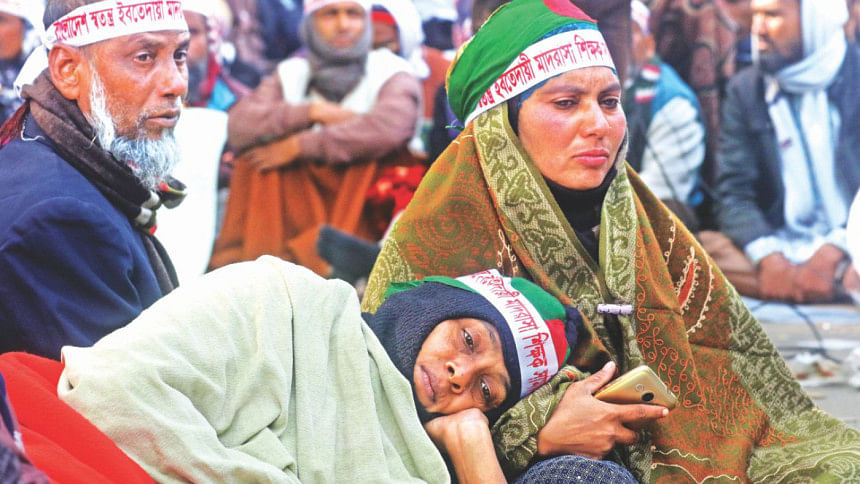This time, madrasa teachers on hunger strike

After staging a sit-in for eight consecutive days, teachers of independent ebtedai madrasa -- primary level educational institutions under madrasa board -- started a hunger strike in the capital yesterday demanding nationalisation of all such registered institutions.
Several hundred teachers started the strike around 11:00am in front of Jatiya Press Club and vowed to continue their strike until they get an announcement from the Prime Minister's Office about the nationalisation of the madrasas.
The agitating teachers under the banner of “Bangladesh Swatantra Ebtedai Madrasa Shikkhak Samity” started the sit-in on January 1.
“Like the primary teachers, we also teach thousands of primary madrasa kids. But we are facing discrimination for decades. Just imagine how a teacher runs his family without any pay for 34 years,” said Qazi Ruhul Amin Chowdhury, president of the organisation.
He said around 18,000 madrasas, regarded as independent ebtedai madrasas for not being affiliated with any Dakhil madrasas, had been registered under the Madrasa Education Board in 1984.
Over the years, the number came down to around 10,000 as the government did not give any salary to the teachers, he said.
Around 48,000 teachers of these madrasas teach students from class-I to class-V.
Ruhul Amin said in 1994, some 6,776 teachers of 1,519 madrasas and registered primary schools started getting Tk 500 as allowances for each teacher through a government circular.
Later in 2013, the government elevated the amount of those teachers to Tk 1,000. In 2016-17 fiscal year, the government increased the allowances of headteachers to Tk 2,500 and assistant headteachers to Tk 2,300 from Tk 1,000, he added.
“But the rest of the teachers have not been paid any allowance whatsoever from the government since 1984. These teachers are leading an inhumane life. Out of shame, they cannot tell anyone that they are teachers,” said Ruhul Amin.
But the salaries and allowances of the registered primary teachers rose in phases and they are now getting salaries like other government school teachers when the government nationalised more than 26,000 such schools in 2013, he said.
Ruhul also said the teachers of the ebtedai madrasas that are affiliated with Dakhil madrasas are getting their salaries. “This is nothing but sheer discrimination,” he added.
“We were astonished when our education minister on Sunday said the government doubled our allowances. Is the monthly pay of Tk 2,500 enough for a teacher to run his family now? And what about the other teachers, who get nothing?” he said.
Yesterday, the teachers were seen chanting slogans for nationalisation holding placards and banners. “Primary teachers are teachers; are the teachers of independent madrasas beggars?” read one such banner.
A number of female teachers also joined the demonstration. “We have been waiting for years to get salaries, but this time we will not return home without the announcement of nationalisation,” said Qazi Mokhlesur Rahman, one of the teachers.
Mokhlesur, also the general secretary of the platform, said no one from the government has contacted them so far.
On Sunday, they submitted a memorandum to State Minister for Technical and Madrasa Division Kazi Keramat Ali.
Earlier, the teachers and employees of non-MPO educational institutions observed fast unto death for six consecutive days demanding enlistment in the Monthly Payment Order (MPO) facilities. They called off their strike following the prime minister's assurance of fulfilling their demand.

 For all latest news, follow The Daily Star's Google News channel.
For all latest news, follow The Daily Star's Google News channel. 



Comments